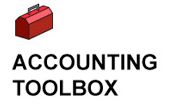Why a Toolbox? A toolbox provides a standard set of equipment needed for different tasks. Each tool is suited for a specific task, but when used together in the proper sequence, they can build a bookcase, a house, or a space station.
Why an Accounting Toolbox? Just as a carpenter or an engineer will select a tool to use for each task to create a finished project, an accountant draws upon a set of tools to support his or her professional work. An accountant's tools are found in the professional pronouncements for the private and public sectors, in the guidance issued by the Security and Exchange Commission; in the United States Tax Code; in the professional and ethical standards of the profession; in the certifying exams; and in the disciplines needed to support business, not-for-profit, and government operations.
The Accounting Toolbox as your professional library. For many years, as accounting students moved into practice, their textbooks formed the foundation of their professional library. With the majority of accounting information relying on digitally accessible, frequently updated data in place of printed text, knowing how to access, interpret, and present the most relevant data will replace the textbooks on the shelf.
Using the Accounting Toolbox. The topics and information included in the accounting toolbox are not exhaustive, and should be considered a foundation level for your undergraduate studies and your professional career. Over time, you should add your own specialized tools to the Toolbox, those resources you have found most useful in your accounting specialty. Other topics tangential to accounting may also become part of your toolbox.
The Accounting Toolbox Components
The Accounting Toolbox is divided into the following ten components:
- Underlying Concepts—the foundational documents in accounting
- Communications Process—the ability to express accounting information through written and oral communication
- Research Methodologies—the ability to research technical accounting and business concepts
- Critical Thinking Process—the ability to analyze information to reach a conclusion
- Technological Support—understanding how technology can support accounting and business decision making
- International Perspective—the ability to incorporate accounting in an international context
- Ethics—the ability to incorporate ethics into decision-making
- Governmental Parameters—understanding the role of the Securities and Exchange Commission (SEC), Internal Revenue Service (IRS), and the Public Company Accounting Oversight Board (PCAOB)
- Professional Development and Networking—identifying those who share a similar professional interest
- Technology Update—accounting, auditing, systems and the 4th Industrial Revolution
Each component will describe its topic, how it relates to other Toolbox components, and how it could be used academically and professionally.
